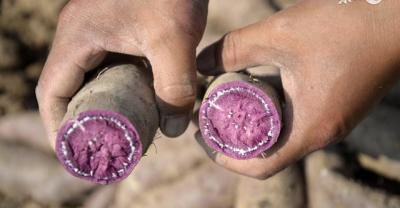How to use growth regulators correctly for vegetables?
At present, the main hormones (plant growth regulators) used in vegetable production are 2mai 4ran D, naphthylacetic acid, indole acetic acid, gibberellin, dwarftin, methyl naphthalene acetate, penicillin, ethephon, paclobutrazol, B9 and so on. The application effects and methods of various hormones are briefly introduced as follows:
1. Hormones that can be used to promote growth and improve the quality of vegetables: spraying leafy vegetables with gibberellin has the best effect. For example, spraying 100 ml / kg gibberellin each 20 days and 30 days before celery harvest can increase production by 30% and 50%.
two。 Optional hormones to promote fruiting and prevent falling flowers and fruits: in early spring or late autumn, tomatoes can be dipped in stamens from 10 ml / kg to 25 ml / kg, dipping in stamens at the beginning of flowering, which can not only prevent falling flowers and fruits, but also mature 10-15 days ahead of time, and increase the sugar content of the fruit.
3. Optional hormones for breaking dormancy and promoting germination: when planting potatoes in autumn with spring potato tubers harvested in the same year, you must go through a dormant period. If you soak the potato pieces with 0.5 ml / kg gibberellin for 15 minutes for 20 minutes, you can break the dormancy period, promote its early germination and reduce seed potato rot.
4. The hormones that can be used to promote the rooting of transplanting seedlings: planting and harvesting Chinese cabbage and cabbage, the leaf bud cutting method can be used to improve the propagation coefficient. The method is to quickly dip the leaf buds with 1000-2000ml / kg naphthalene acetic acid solution to make them take root and form independent plants. When tomato cuttings were propagated, 50 ml / kg naphthylacetic acid or 100 ml / kg indole acetic acid solution was dipped in the base of cuttings for 10 minutes, which could shorten the seedling raising time.
5. Hormones that can be used to inhibit germination and prolong the storage life of vegetables: garlic and onions are sprayed with 2500 ml / kg of fresh element 15 days before harvest, which can be stored for 8 months without germination; radish and carrot are sprayed with 100ml / kg 2ml 4murD 21 days before harvest, which can prevent sprouting and prolong storage life; spraying methyl naphthyl acetate can effectively inhibit germination of potatoes during storage.
6. Optional hormones for preventing overgrowth and cultivating strong seedlings: when raising seedlings of vegetables in early spring, soil application of 250 × 500 ml / kg dwarf can inhibit the growth of seedlings; when raising Solanaceae vegetables in early spring, foliar spraying of 1000-2000 ml / kg B9 can make the seedlings dwarf and stout and prevent overgrowth. Spraying 250ml / kg paclobutrazol at the early flowering stage of potato can promote the lateral growth of the plant, prevent overgrowth, make the plant dwarf and compact, and the leaf color is dark green.
7. Controlling sex and promoting the selection of hormones for more female ears: when zucchini seedlings grow 3 true leaves, 150 ml / kg ethephon is sprayed, and then sprayed once every 10-15 days for a total of 3 times, which can increase the number of female flowers and mature 7-10 days earlier. Spraying 150 ml / kg ethephon on 4 true leaves of cucumber seedlings could also significantly increase the number of female flowers and increase the yield.
8. Optional hormones to promote the ripening of melons and fruits: after ripening and harvesting, soak the fruit in 2000 ml / kg ethephon solution for 1 minute, remove and drain, put it at room temperature of 20-25 ℃, and soon turn red.
9. Optional hormones for controlling heading and flowering: carrots, cabbage and celery were dripped with gibberellin of 20ml / kg on the growth point to promote bolting and flowering in the same year. Spraying cabbage and celery with 4000,8000ml / kg dwarf can inhibit bolting and flowering. At present, the use of such hormones is not encouraged in Shanghai, especially in the production of safe, hygienic and high-quality vegetables.
- Prev

Collection! 9 kinds of slimming vegetables! I can't believe there are so many benefits!
The first tomato is rich in lycopene, anti-acidification can effectively inhibit the activity of reactive oxygen species, while the anti-cancer ability is also quite high. It is rich in.
- Next

The price of eggs and vegetables in Hebei Province dropped obviously after the festival.
According to data provided by the Hebei Provincial Price Monitoring Center, the prices of most daily necessities in Hebei Province have fallen after the Spring Festival. Among them, the price of pork dropped slightly, chicken.
Related
- Where is it suitable to grow horseradish in China? it is expected to see the middle altitude horseradish in Alishan.
- How to prevent tomato virus disease reasonably? (Control methods included)
- Many people like to plant towel gourd on the balcony. What are the main points of this method and management?
- What crops can chili peppers be mixed with?
- Fertilization techniques and matters needing attention in Tomato
- What are the grafting techniques for peach seedlings in spring?
- Harm and control methods of root swelling disease of Chinese cabbage
- What are the pests of sweet potatoes? How to prevent and cure it?
- Symptoms, causes and Control methods of navel Rot in Tomato
- The cause of "Cucumber rotten bibcock" in Farmers' planting Cucumber and its Control Plan

